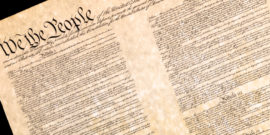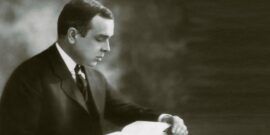Politics is its own sort of endeavor in free societies, quite distinct from either utility maximization or truth-seeking.
Finding Liberty among the Despots
Previously I looked at Bertrand de Jouvenel’s theory of political entrepreneurship. Now I’m going to explore it further by looking at what he says about the relationship between liberty and authority.
In The Pure Theory of Politics, Jouvenel quotes David Hume’s “Of the First Principles of Government” and comments that Hume’s statement below is “perhaps the most important of all political science”:
As FORCE is always on the side of the governed, the governors have nothing to support them but opinion. ‘Tis therefore on opinion only that government is founded; and this maxim extends to the most despotic and military governments, as all as the most free and popular. The soldan of Egypt, or the emperor of Rome, might drive his harmless subjects like brute beasts, against their sentiments and inclination: but he must at least have led his mamalukes or praetorian bands like men, by their opinion.
For many lovers of liberty, authority tends to take on a negative connotation; it is seen as something which chafes me and against which my liberty must strain. But what Hume and Jouvenel recognize is that authority is not mere force and can never be mere force. The greatest human authority, if it ceases to obtain what Jouvenel calls “response,” goes out like a candle. What is required for lasting rule, according to Hume and Jouvenel, is not coercion but rather the opinion of right.
Furthermore, authority for Jouvenel is not a quality inherent in a single element; it is rather the relation between two elements—call them A and B. This relation can be analyzed in two ways: by looking at the sources from which it springs and by looking at the modes in which it operates.
I.
Following Cicero, Jouvenel notes that authority can spring from two sources. Authority can spring from potentia, or what Jouvenel calls natural or informal authority; and it can spring from potestas, or what Jouvenel calls formal authority. Potentia is the potential for authority inherent in an agent; it is similar to what Max Weber might analyze as charisma. Potestas is the authority inherent not in an agent but in a position. It is often the case that these are not manifested together; many middle management types have potestas with no potentia, and many “natural leader” types have potentia with no potestas. The potential for both benefit and mischief is maximized, of course, when someone with natural authority becomes ensconced in formal authority. As Jouvenel notes ominously, the record shows that dangerous men are more dangerous when admitted to potestas than when denied it. Catiline had tremendous potentia, but he was twice defeated for the Roman Senate, whereas a far lesser man, Clodius Pulcher, was more successful because he obtained the potestas of the Tribune; as a result, he was able to lord over Rome and send Cicero into exile. And calling Hitler to the chancellorship did not successfully counter the Nazi challenge to the Weimar Republic; it would have been better altogether, not just in hindsight but in principle, to deny Hitler potestas.
This account of authority may appear strange. But political science, Jouvenel says, deals with appearances, being not a juridical science but rather a phenomenological science. What matters in politics is precisely how authority appears to me, how it exists as a subjective phenomenon within my imagination. We respond differently to an individual initiative—to an “instigation,” in the language of Pure Theory—depending on how we view the source of that initiative. No amount of legal fiction will make us feel that these sources of authority are the same and that instigations from each source as a result demand equal attention and fidelity. I will respond very differently to a cherished friend than to a hated bureaucrat, even though I am in no way the subordinate of the former. Authority cannot be reduced solely to postmodern power relations.
In a way, we can see here Jouvenel’s debt to his “favorite author,” Rousseau. For Rousseau, laws, as a restriction of my freedom, weigh oppressively upon me. This is not a rational evaluation of what is actually the case; the point is that they feel or appear oppressive to me. And they feel less oppressive as I look more favorably upon the source from which they flow, e.g., from a friend; they feel the least oppressive when I myself am the source, i.e., when I give myself the law.
Jouvenel and Rousseau insist that moral and political response is radically different depending upon how the responder views the authority in question. It is not true, Jouvenel says in his most famous essay on Rousseau, that our interests alone move us. Our experience of authority is more or less bearable as our impression of it is more or less favorable.
II.
There are also two modes in which authority can be analyzed. Following Tacitus and the comparative mythologist and anthropologist, Georges Dumézil, Jouvenel calls these modes dux and rex. The dux stirs up passions and is the principle of movement; he “agitates the social particles” so that he may then direct them to collective action. The rex calms them down; he is the principle of order. Jouvenel’s image for the dux is Napoleon leading his troops across the Bridge of Arcola; his image for the rex is St. Louis beneath the Oak of Vincennes, calming down impassioned quarrelers. In other words, the dux is the instigator, the one who generates individual initiatives, who forms teams of action; the rex is the source of stability, the fixity of the frame, the lightning rod. To put this into something like Hayekian language, society itself is self-organizing for Jouvenel, but this self-organization is not as such spontaneous; rather, it is an equilibrium between constant instigations by duces and constant efforts at maintenance by reges.
Jouvenel spends a significant amount of time in On Power, Sovereignty, and The Pure Theory of Politics discussing so-called “primitive societies.” What he finds is that any type of central authority or “state” in these societies functions principally, if not exclusively, as a rex. That is, the job of those who rule is to ward off destruction and to maintain the society’s folkways. Innovation and novelty are not forbidden but neither are they promoted without reflection; rather, innovation is seen to be fruitful only within the proper, inviolate parameters. (This seems cognate with what Hayek says about rules requiring stability in order to perform their function as rules.)
There are two related problems as a society moves from a “primitive” form to a more “advanced” or modern form. One problem is that the central governmental components in any polity—what Jouvenel calls “Power”—become increasingly jealous of rival authorities. As various duces operate—and especially as they attain potestas—they literally become rival Powers within the same society (the Hobbesian “worms in the Commonwealth”). The second problem is that Power, partly of its own initiative but partly in response to these rivals, begins to transform itself and to understand itself no longer as a rex but as a dux. Not only the rhetoric but the self-understanding of government begins to alter, with the result that the mode in which it exercises its authority begins to alter.
In theory, the state in a modern liberal society is supposed to merely provide the fixity of the frame. The state’s job to maintain the roads and to prevent people from running into each other; its job is not to tell you where to go on those roads. On this almost all liberals agree. But in practice what happens is that modern states increasingly become dux-like and increasingly seek to level or destroy other duces and rival Powers. This, in broad strokes, is what Hannah Arendt called totalitarianism: Power aggressively eliminating rival sources of authority, such that all buffers between the individual and the state are removed. The state becomes the ultimate dux, and there is no longer any rex to check it.
III.
Where is liberty in such a dark account? Jouvenel’s answer is that liberty is actually a component of the relationship of authority. Instigators do not have the final say; as Hume notes, force is always on the side of the governed, even in the most oppressive tyranny. Individuals always have the choice of whether and how to respond to any political entrepreneur. And so it is response rather than instigation that Jouvenel dubs the “king-maker.” In a way, you can see the French existentialist idiom emerge here; it is not hard to hear echoes of Albert Camus and Jean-Paul Sartre in what Jouvenel is saying. No matter what happens, I will always remain my own; no matter what happens, I can always say no. The last of human freedoms, as Viktor Frankl says, is to choose one’s attitude in any given set of circumstances. No matter what any dux asks of me, I can refuse. And in that strength, in the liberty of the individual, is a tremendous refuge from all oppression, including that of the state.
Jouvenel formalizes the relation as follows: A tells B to do H. Again, it is a phenomenological account; what matters is how things appear to the responder. B might agree completely based on how A appears to him; this is a “pure A response.” B might agree completely on how the content of H appears to him; this is a “pure H response.” Most responses are a mixture of the two types: we choose to comply based on whether and, to what extent, we individually find A and H compelling. This is why authority is not an enemy of voluntary action for Jouvenel; authority in fact only exists when and where voluntary action exists. Unless at least one of A or H appears as a legitimate and worthwhile thing to ask of me, I can, and will, simply refuse. And you can feed me to the lions; you can torture me. But there is no way to obtain my response should I choose to simply say “No.” And when enough people say “No,” governments can collapse overnight.
In this sense, Jouvenel is a tremendous champion of individual liberty. He does not think that either authority or the state is altogether bad; as we’ll see next time, his view of the state is more nuanced than often believed. But he does think that what is altogether good is not only the freedom to form groups via instigation but the freedom to say no to those instigations. Though a dux slays me, yet can I resist him. In that sense, the individual reigns supreme.
What remains is to think through this notion of liberty more fully, to see how all individuals are rooted in social soil, and to see how a free individual can effectively stand up to Power. I’ll take up these topics next time.


